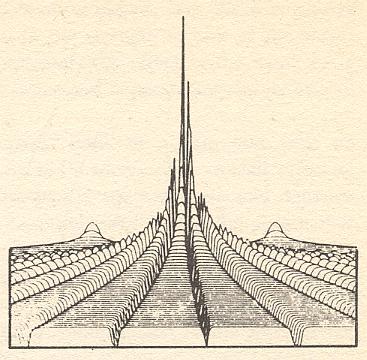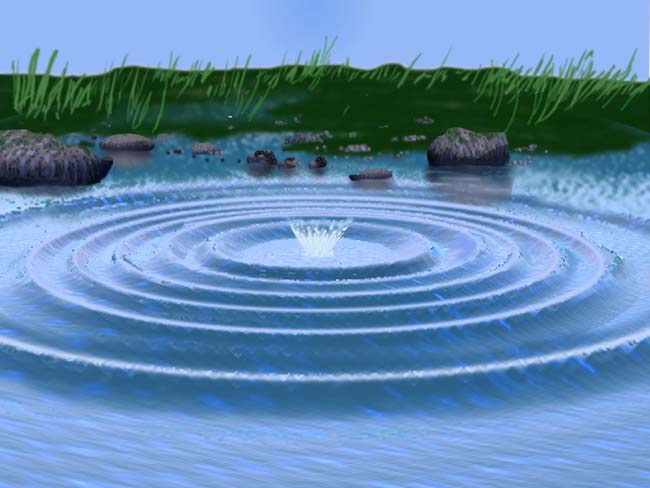Comments
-
Cogito, ergo sumIt life is a cycle of experimentation and learning, the reasoning is one apprach. It needs to be combine with intuition and creativity if something entirely new is to be discovered. When I already learning the piano or drawing it is almost entirely intuition, creative motion and observation.
-
All Talk No ActionI forgot where I read it but the author wrote that relationships are the most difficult thing that one can attemptin life.
He is on his journey and you are on yours. Can both of you figure out a way to work it out? It does take two to Tango and I assure you, from experience, the Tango is very difficult since it requires two to dance as one.
All I can suggest is to be true to yourself, say what you feel and then observe and learn from what happens, all the while paying as much attention to yourself to others. Hope this helps a bit. -
Classical, non-hidden variable solution to the QM measurement problemYes, that guy has a lot of intriguing science oriented information - you should have a look at his channel, it's quite cool. He's one of the few smart people around on youtube in my opinion. — Agustino
Really like what he is doing on YouTube. -
Classical, non-hidden variable solution to the QM measurement problemActually, that video was pretty amazing! Maybe there really is something to pilot waves. I didn't know there was a classical system that produced similar results for the double slit experiment. And you can see it happening! Definitely helps visualize de Broglie's interpretation.
I guess the bouncing silicon oil drops creating the standing waves is a classical pilot wave system. — Marchesk
I believe that it was Bohm in one of his writings who suggested that there really wasn't a particle in the De Broglie-Bohm Interpretation, but rather what we witnessing is a wave perturbation. This would make the theories realistic properties quite straightforward to understand from a realistic, conceptual point of view. The impulse behind this wave perturbation is something to ponder which is why Bohm suggested that his model leaves open the possibility for creative impulses in his Implicate Order. The video was quite interesting.

-
Can we be mistaken about our own experiences?I keep on coming back in my thoughts to a Tom Waits lyric: “time is just memory mixed with desire” — javra
Pretty much straight out of Bergson.
Time is memory with intent to action (desire).
Very nice indeed. I wonder if Wait arrived at this via his own intuition? -
Philosophy of Drugs and Drug useI think it is difficult to define what is a drug. Clearly we live in a drugged out society. Twice as much people died last year from overdoses of perscription opioid drugs than from illegal heroin. And clearly the consequences of drunken driving is enormous and it is tolerated by our culture. Personally I don't take any drugs. Maybe a dozen aspirin in the last 35 years. My feeling is that to maintain good health just eat good food.
-
Can we be mistaken about our own experiences?
I am not sure where Bohm was directly influenced by Bergson but he must have been indirectly influenced.
Also, this may be interesting once you have some background on Bergson.
http://www.stephenerobbins.com
His papers are difficult to follow but had lots of depth. He has some Youtube videos that are bit easier to follow. Some interesting ideas to compare with Bohm's Implicate Universe. But definitely start with the source of it all, Bergson. -
Classical, non-hidden variable solution to the QM measurement problem
I agree that the math is just to tool and lots of written and spoken words as well as experiments preceded and followed. However, for science the math is what counts. For philosophers, everything else is most relevant.
In so far as as the"measuring device" is concerned, and I'm quite surprised that Binney does not recognize it, exactly what are the boundaries to the "measurement device" and how do you ever establish its state if it is constantly changing?
This topic was well discussed and Bohr addresses it in the paper I referenced above.
To put a sharp point on the problem, light (or photon) limits certainty. So, the next question for a philosopher is what exactly is light? - and I am referring to something more than the scientific definition. -
Can we be mistaken about our own experiences?
First, I must apologize. I corrected my post, but too late. I was referring to clock time.
Clock time is really a measurement instrument for trying to establish simultaneity. It is not lived time, and making it lived time and elevating it to some ontological theory creates all kinds of paradoxes which simply are not real.
But to answer your question. Bergson views the future as virtual action. It is what is intended but has not been. At this time, not having pondered this too much, it seems reasonable. -
Can we be mistaken about our own experiences?
I understand everything you wrote. It is the concept of space-time where we diverge. Memory is not situated in space-time as view it. Memory, as I view it, is holographic that is constantly in flux. (There is no present, since that would require a freezing in the movement of memory). It is this evolving memory that creates the psychological feeling of time - real time. For example, how do I know that I exist and am evolving? It is the memory of myself juxtaposed on a prior memory of myself. The two memories create time. The time of scientists, or clock time, is different. Clock time is a spatial movement used to measure (with inaccuracies) the simultaneity of events. This is not the time that we feel as time. The time we live - real time - is evolving memory. -
Can we be mistaken about our own experiences??
As I said, my model for memory is very expansive and could roughly described as a holographic model of information. Probably no reason to go totally off topic with this idea. However, insofar as my past is concerned, it is for all intents and purposes what I remember. Where all other memory of events are stored and how they are experienced and and evolve is a much larger question. -
Is suffering all there is ?
Buddhism doesn't not suggest that all life is suffering (happily). Buddhism suggests that suffering is a response to desires. A reasonable response. The more one desires, the more they suffer. So one can take from this that suffering is trying to suggest that maybe a little less desire is the way to go. Hence, the eight fold path of moderation. Suffering isn't inevitable, it is more of a warning. It can be softened with moderation. -
Can we be mistaken about our own experiences?
It is a sharp point that you bring up.
My birthday is a certain date as I remember it. I find a birth certificate which changes that memory that I have. The date and the birth certificate are now part of my memory as well as my original memory of what I thought was my birthday. In totality my past has evolved and changed quite a bit. Now suppose someone come along and tells me the birth certificate was wrong and I was correct with my original memory. Now my memory of my past has changed once again. It is constantly evolving as is everything else. -
Can we be mistaken about our own experiences?
I do not hold the view that a past can be more than how it is remembered.
Yes, a photo can remind someone of a past event, but it doesn't become part of the past until it becomes part of one's experience in one's memory. Of course, a memory of that experience could already exist and may change (evolve) because of photo. The photo itself is merely another experience within memory.
The fundamental question is whether the past exists outside of memory. It all depends upon ones's personal ontology I guess. My view of memory is very expansive and probably to much off the track to get into now. Suffice to say I lean toward Bohm'/Bergson holomovent view of memory and information which has been amplified by subsequent authors. -
Can we be mistaken about our own experiences?t
It appears to me that the past is constantly changing. In fact, it is the only thing that is changing as it evolves into a new past. -
The relationship between intuition, logic, and emotion
I don't see emotions as a weakness. I see it as one of the necessary ingredients to create, explore, and learn. It is what makes life interesting. -
The relationship between intuition, logic, and emotionUnderstanding your point of view, I would suggest another.
That human beings fundamental purpose is to experiment and learn. By learning they evolve. Intuition is the creative impulse that allows for change in direction (otherwise we become creatures of habit). Logic is one of those learned tools that we use to learn further. Emotions are like signs on a road, pointing is to me directions or hazards ahead!
On the form poll, I would put intuition (creativity) and emotions as far more fundamental and crucial than logic. -
Can we be mistaken about our own experiences?Two contiguous things:
Waves are continuous within themselves.
However, issues arise when one attempts to measure/identify a wave. Where does it begin and where does it end? Similarly one might think of memory (experiences) in duration as an undivided, ever changing whole, with no way to precisely define where a memory or experience begins or ends. It all flows and permeates each other. This flow of memory/experience is time. It is literally what we are feeling as we experience time. -
Classical, non-hidden variable solution to the QM measurement problemReading Bohr's seminal work on Complementary and the Uncertainly Principle:
https://www.marxists.org/reference/subject/philosophy/works/dk/bohr.htm
It once again occurs to me that the absolute, fundamental issue here, as it is with Relativity, is the notion that instrumentation will provide all the necessary knowledge that we need in order to understand the nature of the Universe. The limitations are clear and Bohr spells them out in this paper. Quite literally, and simply, you cannot find out everything you want to know about something that is in continuous flux by attempting to freeze it in an instant with an instrument. And if you allow it to change in its continuous flow then whatever you may know has vanished and is no longer true.
Hence, if one wishes to understand the nature of the universe, it is necessary to give up the notion that instruments will ever provide a full description. QM and Relativity are attempting to provide solutions to instrument measurement problems and at their limits they cannot. Beyond that, other means must be used.
Heraclitus and Bergson were correct, as was Bohm who realized that in order to pry deeper one must use intuition (the mind). If this is unsatisfactory, then one must learn live within the limits of instrumentation. It appears that Binney has not. As I indicted, it is impossible to measure the state of an undivided whole if one is part of that whole. -
Classical, non-hidden variable solution to the QM measurement problem
I'm astounded by the number of comments on this video. Who would have thought that Pilot Wave is as popular as Kim Kardashian. -
Can we be mistaken about our own experiences?
Exceptions are only necessary when an underlying model creates uncomfortable paradoxes, e.g. the Zeno paradoxes.
In the Bergsonian model, change is in duration, not between some moments in time. Continuous, indivisible, heterogeneous change is synonymous with duration which we feel as some memory transforms into a different memory. That is how we can feel our own continuous existence. There are no in-between moments in such a movement from one memory into another. This time is not a series of simultaneities in space, e.g. clock movements, but rather time is felt as some change in duration. -
Classical, non-hidden variable solution to the QM measurement problemOne way of envisioning an Implicate Order, as Bohm refers to it, is a field of information where any new information affects all existing information that is stored as a holomovement that is in constant flux. Duration would be a manifestation of this holomovement that we experience as the underlying consciousness of this flux. Space emerges as a product of these movements.
http://dbohm.com/david-bohm-holoflux-holomovement.html
Can we set all conceptualize what such an undivided whole might feel like? I propose that a dream may provide some clues. -
Classical, non-hidden variable solution to the QM measurement problem
Agreed. This is why it is necessary sometimes to read between the lines to better understand what the debate is all about. Bohm's solution was ingenious but reputations were at stake. -
Classical, non-hidden variable solution to the QM measurement problemWhat I was intending to get at is that the experiment appears to fully substantiate that consciousness has some top-down causal role in what physically, presently is. And it does this by accounting for all variables that could lead to alternative conclusions. I, at least, wasn't imaginative enough to find any. — javra
I think that Bohm was necessarily cautious about declaring consciousness and/or free will is necessitated by QM. Primarily, he sought to bring real, orthogonal meaning to the QM equations that can be readily conceptualized. It was enough for him that there was room for consciousness, free will, and creativity in what he called the holomovement of the Implicate Order.
Bergson, forsaw all of this and though I have never read where Bohm may have been influenced by Bergson, De Broglie certainly did read Bergson and may have indirectly influenced Bohm.
Bergson, via his own philosophical process, does come to the conclusion that there is Free Will, and it influences the evolution of Time (his capitalization) in a manner that corresponds to QM (De Broglie write an essay on this). Bohm dared not go so far though he's clearly implied it was there in his later works. One must remember that the instrumentalists are always ready to pounce on any one who dares to open the doors to free will and creativity. -
Classical, non-hidden variable solution to the QM measurement problem
The De Broglie-Bohm addresses the delayed choice by an instanteous action at a distance by the quantum field. So the photon that has passed the slit is still subject to the quantum field at the slit. Of course, the observer who also participates in the field has an effect. With the possibility of free will, we have a casual model of QM which permits creative actions.

-
Can we be mistaken about our own experiences?Changes are occurring in a flow of time which Bergson calls Dureé to avoid confusion with clock time. We experience this flow as Memory being directed to some action. And the flow continues. It is heterogeneous and indivisible. Any attempt to carve instants out of this flow lead to the paradox of how to create flow out of a series of instants at rest.
The Present creates an instance of rest within a flow. Hence, we are back to Zeno's paradoxes. As I said, you appear to want to have a flow and an instance within the flow called the Present. I cannot see how you are accomplishing this, but apparently you are satisfied that you have done it. -
Can we be mistaken about our own experiences?
You are insisting on a past, present, and future carved out of a continuous flow of time in some fuzzy way. Sorry, I don't even know where to begin to respond to such a question without being pulled into fuzziness. Something in your model has to give or forever remain in the Purgatory of fuzziness. -
Can we be mistaken about our own experiences?
The changes are occurring as a continuous process, which is why Bergson chose to call the process the Dureé. He jetison's the concept of the Present since it falls into the scientific trap of an instantaneous moment within a constant flow. This, using scientific time, i.e. the concept of instants, leads to paradoxes.
Your Present is actually Bergson's Dureé. -
Can we be mistaken about our own experiences?
Yes, changes are occurring as a process of the past (Bergson's Memory) moving and flowing into a potential future, which is unfolding as a result of this process. Again, I underscore, the one and only issue is attempting to carve out a Present within this continuous flow. -
Can we be mistaken about our own experiences?This is also a good thing to stress when folks are wondering what I'm saying different than the traditional physics notions when I say that time is identical to change or motion, or when they think that there's a problem with my ontology of time simply because it doesn't match the normal way of thinking about time in physics. — Terrapin Station
For me, there is no issue in understanding this as it has been very well described by Bergson in his initial writings and has been amplified by subsequent writers on this subject. There is this ongoing debate on the nature of time, and I am quite comfortable with Bergson's Dureé, while also understanding the usefulness of scientific time when it comes to measuring and predicting simultaneity within acceptable and achievable tolerance levels.
The issue is your attempt to carve out a Present within a flowing time. It simply cannot be done without creating an instance that stops all motion and time. This is the area of fuzziness sinks the Present ship by no means sinks the concept of time as a flow. -
Can we be mistaken about our own experiences?
I read the entire sentence, and you are trying to have your cake and eat it. This is an entirely different issue which I cannot address. That is what philosophy is all about. -
Can we be mistaken about our own experiences?
It's that relative fuzziness that sinks the ship. Or as is often said, you can't have your cake and eat it. -
Can we be mistaken about our own experiences?It's not a want. It's what the world is like. There are changes that are occurring versus changes that occurred. — Terrapin Station
I cannot find the line between the two different states, but apparently you have. -
Can we be mistaken about our own experiences?
I think you will have to think it through, since it seems you want to distinguish a Present (a particular state) from a past (I won't get into the notion of a "future"). If the two just blend into each other as a flow, then you are simply using a different word for Bergson's Dureé. The only problem then is the word you choose to represent the process since most commonly the Present would be used to describe an instantaneous that can be distinguished from the Past. I'm not sure whether or not you are actually trying to do this. If you are, it simply cannot be done in a continuous flow.
Rich

Start FollowingSend a Message
- Other sites we like
- Social media
- Terms of Service
- Sign In
- Created with PlushForums
- © 2026 The Philosophy Forum
